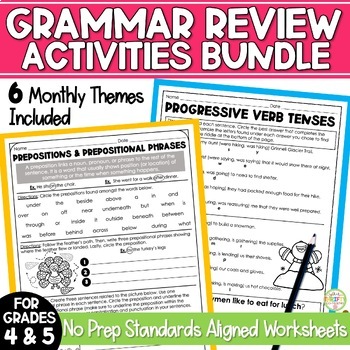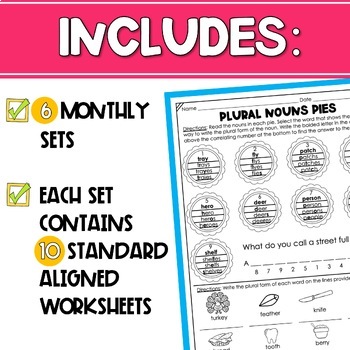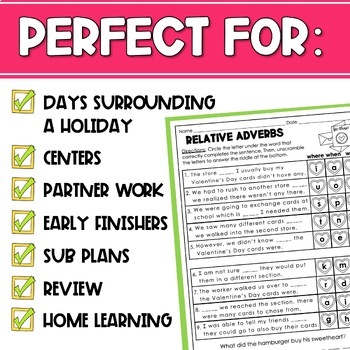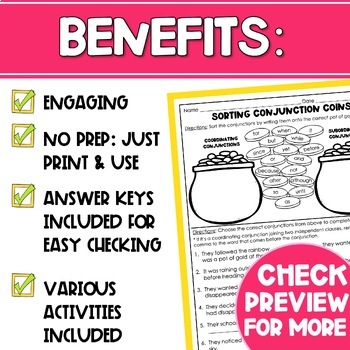Grammar Practice Worksheets Monthly Holiday Themes Bundle
- Zip
Products in this Bundle (6)
showing 1-5 of 6 products
Description
This Grammar Practice bundle contains 6 monthly holiday theme sets that contain ten No Prep worksheets designed for 4th & 5th grade students. They contain engaging practice activities that make reviewing grammar fun for your students throughout the year.
Months included: November, December, January, February, March & April
Perfect for:
• Literacy Centers
• Morning Work
• Differentiated Learning
• Homework
• Early Finishers
• Intervention Classes
• Tutoring
• Thanksgiving Day Competition
Ideas for Use:
• Make individual copies for students to work on
• Place copies in sheet protectors and have students write on them with dry eraser markers
• Copy them and keep them in a bin inside your classroom. Students choose the one they want to work on.
Monthly Sets Include:
November:
- Frequently Confused Words Crossword Puzzle (two, too, there, their, then, than, our, hour, wear, where)
- Parts of Speech Turkey Feathers (Nouns, Verbs, Adjectives, & Adverbs)
- Turkey Titles: Capitalizing & Punctuating (movies, books, poems, & songs)
- Prepositions & Prepositional Phrases: Identify, Create, & Write
- Noun Spill Clean Up: Sort & Write (Common, Collective, & Abstract)
- Plural Nouns Pies (-s, -es, -ies, stays the same, & change the word)
- Corny Commas (in a series, coordinating conjunctions, tag questions, & appositives)
- Turkey Escape (Commas and Quotation Marks)
- Proper Nouns Pies (days, months, holidays, countries, books, stores)
- Order of Adjectives (NOSASCOM)
December:
1. Comparative & Superlative Adjectives (-er, -est, more, most, good, bad)
2. Santa’s Sentence Structures (simple, compound, complex)
3. Correlative Conjunctions Cocoa (neither/nor, either/or, not only/but also, whether/or, both/and)
4. Sleighing Sentences
(Identifying complete, run-ons, and fragments)
5. Stocking Stuffing Conjunctions
(coordinating and subordinating)
6. Possessive Nouns
(singular and plural)
7. Perfect Tenses with Irregular Verbs
(past, present, future, past perfect tense, & future perfect tense)
8. Present Tense Verbs
9. Comet’s Commas
(introductory words and tag sentences)
10. Parts of Speech Trees
(nouns, verbs, adjectives, and adverbs)
January:
- Capitalization Practice (starts of sentences and proper nouns)
- Relative Pronouns (who & whom)
- Contractions Snowball Fight (not, will, would, have)
- Recognize and Correct Inappropriate Shifts in Verb Tense
- Subject-Verb Agreement (identifying subjects & verbs: adding –s to verb)
- Progressive Verb Tenses (past & present)
- Concrete & Abstract Nouns
- Plural Nouns Crossword
- Cocoa Commas (introductory phrases)
- Relative Adverbs (where, when, and why)
February:
- Frequently Confused Words Crossword Puzzle (by, buy, bye, scent, sent, cent, lose, loose, new, knew)
- Parts of Speech Sweethearts (Nouns, Verbs, Adjectives, & Adverbs)
- Relative Adverbs (where, when, why)
- Recognize Inappropriate Shifts in Verb Tenses (am, is, are) (has, have)
- Comparative & Superlative Adjectives (-er, -est, more, most, many, good)
- Prepositional Phrases
- Irregular Verbs Word Search
- Cupid’s Commas (conjunctions, appositives, tag questions, introductory phrases, and in a series)
- Correlative Conjunctions Cards (neither/nor, either/or, not only/but also, whether/or, both/and)
- Valentine Titles (Capitalization and Punctuation)
March:
- Parts of Speech (nouns, verbs, adjectives, adverbs)
- Patty’s Plurals (-s, -ies, irregular plurals)
- Comparative and Superlative Adjectives (-er, -est, more, and most)
- Prepositions & Prepositional Phrases: Identify, Create, & Write
- Clover Commas (in a series, coordinating conjunctions, tag questions, & appositives)
- Order of Adjectives (NOSASCOM)
- Sorting Conjunction Coins (Coordinating and Subordinating)
- Recognizing Complete Sentences (complete, run-on, & sentence fragments)
- Relative Adverbs (where, when, & why)
- Subject / Verb Agreement
April:
- Recognizing Complete Sentences #1 (complete, run-on, & sentence fragments)
- Order of Adjectives (NOSASCOM)
- Parts of Speech (conjunctions, prepositions, & interjections)
- Perfect Tenses with Irregular Verbs (past, present, past perfect tense, present perfect tense, & future perfect tense)
- Funny Bunny Commas (nouns of direct address)
- Egg-cellent Plurals (-s, -ies, & irregular plurals)
- Adjectives (comparative and superlative)
- Rabbit Tales: Capitalizing Titles (poems, songs, books, movies)
- Recognizing Complete Sentences # 2 (complete, run-on, & sentence fragments)
- Recognize and Correct Inappropriate Shifts in Verb Tense
Check out the preview for a closer look at the pages!





